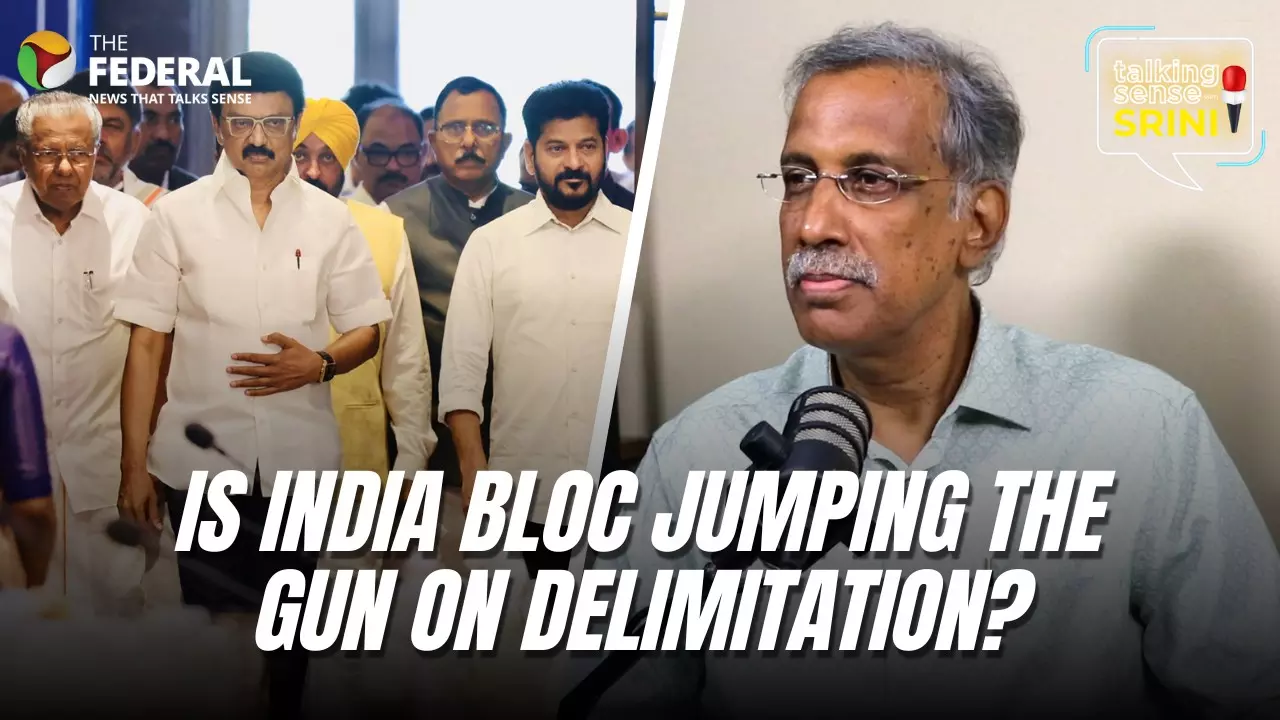
Is INDIA bloc jumping the gun on delimitation? | Talking Sense With Srini
A fair and well-thought-out solution to the delimitation puzzle must consider both demographic and economic realities, as well as core principles of federalism

In the latest episode of Talking Sense With Srini, The Federal’s Editor-in-Chief, S Srinivasan, offered insights into the ongoing debate around delimitation and its implications for Indian federalism.
Tamil Nadu Chief Minister MK Stalin hosted the first Joint Action Committee meeting in Chennai on Saturday (March 22), calling for “fair delimitation”. Three chief ministers — Telangana’s Revanth Reddy, Kerala’s Pinarayi Vijayan, and Punjab’s Bhagwant Mann Singh — participated in the meeting alongside other high-profile leaders of the INDIA bloc, demanding a status quo on delimitation for the next 25 years and slamming Home Minister Amit Shah’s “pro-rata” thesis as a bluff. The conversation delved into the concerns raised by southern states, especially Tamil Nadu, regarding the upcoming delimitation exercise after the 2026 census.
Political backdrop
Srinivasan began by discussing the political backdrop, pointing out that everything politicians do, including this meeting, has an electoral motive. Southern states, which are experiencing slower population growth compared to their northern counterparts, are worried about the implications of the population-based delimitation, which could give more representation to the north. Stalin organised the meeting to highlight this regional disparity, urging the Centre to reconsider the proposed delimitation process, which could disproportionately favour states with higher population growth.
Srinivasan elaborated on the significance of Tamil Nadu’s initiative, noting that the state had often been at the forefront of national issues. Stalin’s push is not just for Tamil Nadu, but also for other states with lower population growth, such as West Bengal and Punjab, to maintain their fair share of representation in Parliament. The resolution from this meeting advocates for a status quo for the next 25 years, freezing the delimitation process to avoid exacerbating regional imbalances.
Also read: BJP's Annamalai reiterates pro-rata delimitation amid Stalin's power play
Delimitation freezes
The conversation touched upon the history of delimitation freezes in India, which were first implemented in the 1970s as a measure to control population growth. However, the expected demographic balance has not materialised as anticipated, particularly with southern states now having a fertility rate below the replacement level. As a result, the southern states fear that continued population-based delimitation will tilt the balance of power further toward the north, where states are still experiencing higher growth rates.
Despite the genuine concerns raised by southern states, Srinivasan acknowledged the criticisms that the timing of this initiative could be politically motivated, especially with the 2026 elections on the horizon. He stressed, however, that the issue is far more complex than electoral calculations and requires a thorough discussion of federalism, population trends, economic development, and local identity.
Also read: Chennai: Delimitation meet wants 25 years freeze; who spoke what
KTR’s radical formula
The meeting also saw a proposal by BRS’s KT Rama Rao, who introduced a radical formula for delimitation based on fiscal contribution rather than population. While this suggestion raised eyebrows, Srinivasan argued that it could not be the sole criterion, given the interdependence of states and the need for an equitable distribution of power.
As the debate rages on, southern states are united in their stand against a population-based delimitation, but they face fragmentation within their own political camps. National parties like the Congress are caught in a dilemma, with their southern representatives vocal in support of the southern states’ concerns, while their northern counterparts hesitate to take a firm stand. Meanwhile, the BJP remains largely silent on the issue, with some of its leaders, including Amit Shah, assuring that the southern states would not lose seats, but without offering clarity on how the northern states would be affected.
In conclusion, Srinivasan highlighted the complexities of delimitation, emphasising that a fair and well-thought-out solution must consider both demographic and economic realities, as well as the core principles of federalism.
The content above has been generated using a fine-tuned AI model. To ensure accuracy, quality, and editorial integrity, we employ a Human-In-The-Loop (HITL) process. While AI assists in creating the initial draft, our experienced editorial team carefully reviews, edits, and refines the content before publication. At The Federal, we combine the efficiency of AI with the expertise of human editors to deliver reliable and insightful journalism.

